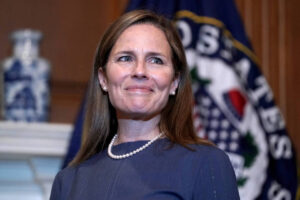
Before Supreme Court Justice Ruth Bader Ginsburg was buried, President Donald Trump was already making moves to fill her seat on the high court.
On Saturday, Trump formally nominated Amy Coney Barrett, who serves as a circuit judge on the U.S. Court of Appeals for the 7th Circuit.
This doesn’t come as much of a surprise as Trump had appointed Barrett to her current position on the 7th Circuit in 2017.
Barrett had also been a finalist when choosing a nominee to fill Justice Anthony Kennedy’s vacancy in 2018.
Although she didn’t make the final cut then, Barrett’s meeting with the president and his advisers solidified her spot on his roster of possible candidates if need were to ever come again.
Well, it has come again.
Barrett, 48, grew up as the eldest of seven children in New Orleans, Louisiana; specifically, the small suburb of Metairie. Her father served as an attorney for Shell Oil Company and her mother was a high school French teacher.
Barrett went on to attend Rhodes College where she majored in English literature and minored in French. Barrett graduated in 1994 with a B.A. She began to study law at Notre Dame where she graduated in 1997 with her Juris Doctor.
After law school, Barrett served as a law clerk to Judge Laurence Silberman and Justice Antonin Scalia. Barrett also returned back to her alma mater as a visiting associate professor for constitutional law, civil procedure and statutory interpretation.
Barrett, an originalist, is known to be straight and narrow in the interpretation of the constitution,
“The Constitution’s meaning is fixed until lawfully changed; thus, the court must stick with the original public meaning of the text even if it rules out the preference of a current majority,” she wrote in a 2017 law review.
In a 2019 ruling, Barrett was the only member of the 7th circuit panel to dissent during the Kanter vs Barr case.
While the panel majority upheld the law that convicted nonviolent felons were prohibited from having firearms, Barrett felt that the ruling violated the 2nd amendment.
In her dissent, she wrote that “holding that the ban is constitutional … does not put the government through its paces, but instead treats the Second Amendment as a second-class right.”
The country has been divided on the premise of gun regulation for years now. With the appointment of Barrett, the stricter regulations that many ask for could be put on the back burner.
One of Barrett’s strong ideals is dismantling the idea of precedent.
During her time teaching, Barrett published an article in 2013 that “voiced support for Supreme Court justices voting to overturn past precedent when they fundamentally disagreed with it,” according to The Wall Street Journal.
The Trump Administration has worked persistently to limit abortion rights, and the appointment of Barrett could ultimately lead to the overturn of Roe vs Wade.
Barrett is a past member of the pro-life group, Faculty for Life, at Notre Dame. The group works “to promote research, dialogue and publication by faculty who respect the value of human life from conception to natural death.”
Known for being a devout Roman Catholic, Barrett’s religion has been called into question on the basis if she’ll be able to separate church and state when conducting cases.
During her 2017 appellate-court confirmation proceedings, Barrett established that although she is grounded in her faith, ultimately, it wouldn’t shape her decisions.
When it comes to Barrett’s court decisions it’s hard to see where she aligns with the LGBTQ+ community. With still being a newly appointed federal judge, Barrett hasn’t made her stance very widely known in the courtroom. She has, however, given her own personal opinion through law reviews, academic journals, personal letters to organizations and lectures.
“In her Jacksonville University lecture, Barrett similarly deployed language suggesting an adversarial stance toward trans issues by misgendering transgender women, calling them ‘physiological males.’ according to Vox.
With the possible appointment of Barrett, we’ll be watching the following of precedent being undone as a new wave of conservatism washes over the supreme court. The legal work that has been put into the country has the possibility of being eradicated just by one filled vacancy.